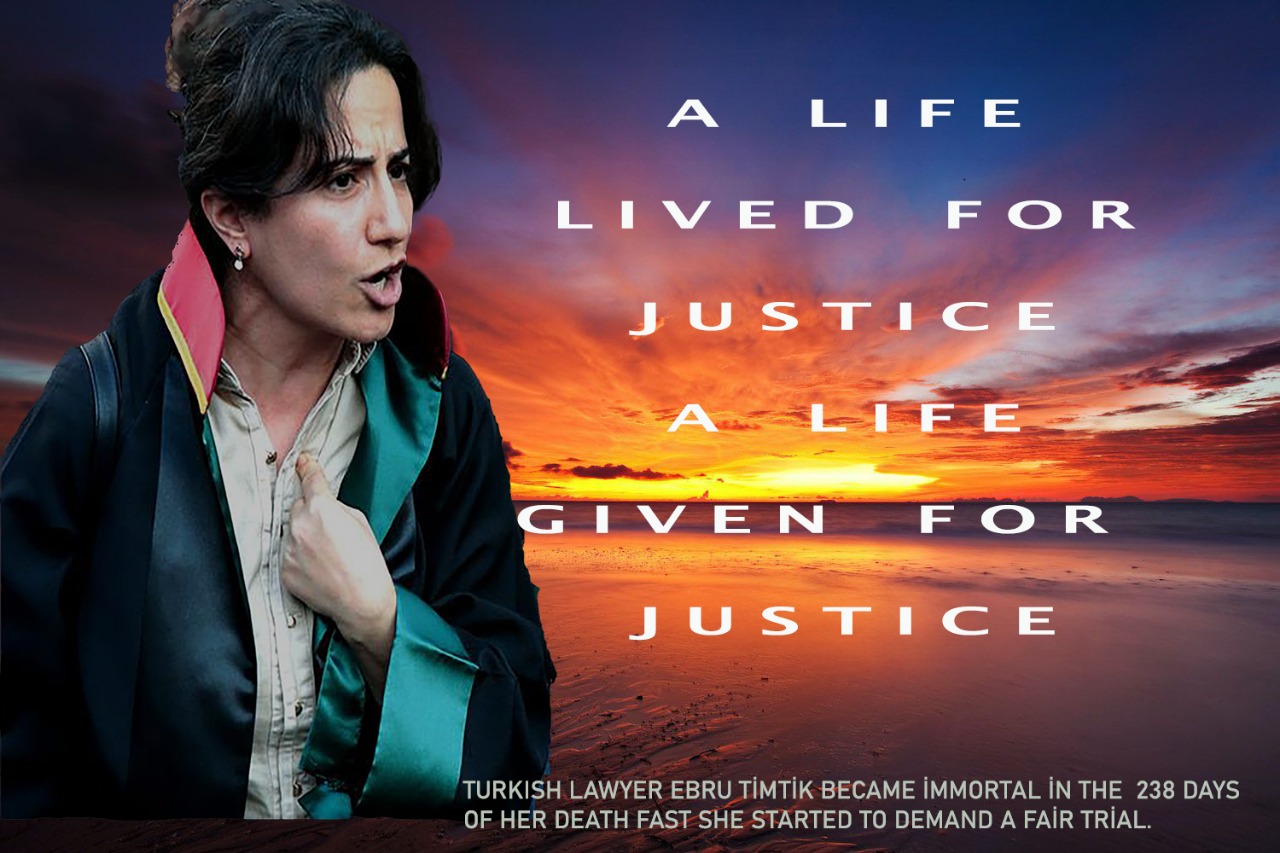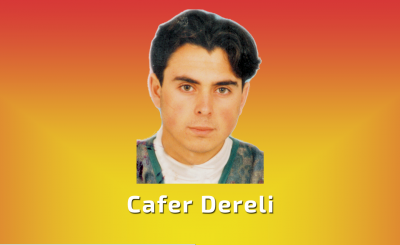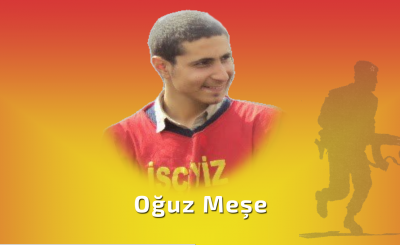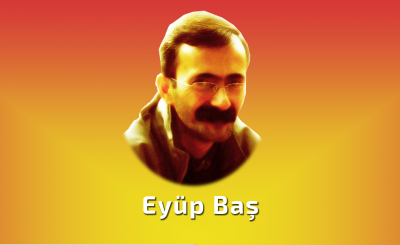My dear client,
How are you? With all my heart I would like to be able to respond to the letters of all who write to me. But I can’t, I’m just content to send greetings, please excuse me for that.
I would like all those who want justice to show their support for our Death Fast. You are right, such support will make us very happy. Workers, retirees, the unemployed people can support this resistance against injustice in the production process. Those who have become victims of the injustice in the courts can realize, that this resistance is for them as well. Otherwise, our Death Fast is not just about our life, which is now like the life of a bird.
You asked me to tell you about myself.
My story is a story of the injustices I have experienced. I lost my father when I was 7 years old. My sisters were 5-3 and 6 months old. My mother was only 22 years old. Until then, I lived in affluence. But then we moved to the city of Elazığ (eastern Turkey / northern Kurdistan), and the days began in which we were trying to survive on my mother’s widow’s pension and orphan allowances.
My sisters and I asked my mother, “Mom, are we poor or rich?” And our mother replied, “We are middle-class my daughters, why should we be poor? There are people who are in a worse position than us.“ pointing out the people in the neighborhood who were in a difficult situation. “We still have a pension, allowances. And there are those who are unemployed, disabled.” But each of us was seeing, the children in the neighborhood who were forced to work, the different types of sandals of the children at school, the different attitudes of teachers to each child, and the differences in the food on the table of each family.
Everything that is developed as qualities of my personality, everything good, beautiful, moral is the merit of my mother.
My mother was a 22-year-old woman who graduated from elementary school. Her life passed first in the village, then in the city of Elazığ, and finally in Istanbul. But since she was either pregnant most of the time or busy raising her children, she didn’t have time to go out and walk on the streets. When her husband died, she was at the age of 22, and despite this fact, she refused to remarry. She dedicates her life to caring for her children. After my sisters and I grew up a bit, she started working in a cement plant. She worked there while the plant was still state-owned. We have all seen corruption with our own eyes. We saw the bureaucrats and all the other capitalists exploit and destroy the plant together. We saw how two other people who worked the same job as my mother was paid twice as much as her, so we understood what pay inequality means. This was because they were employed on permanent contract and my mother worked on a temporary contract. She was forced to agree to receive a minimum wage. When the director of the factory humiliated her, she left her job without hesitation. She started working as a housemaid, of course, we followed her in this endeavor. The first job I did for a fee was cleaning houses. Then during the holidays, I went to Istanbul and worked as a seamstress in various companies. I tried to work as a distributor of various products, but this job was definitely not for me.
When I was a student at university I worked in local radio. I worked as a radio and television presenter, as well as in the field of marketing. I made pies and other snacks at home and sold them in various cafes. During this period we had opened a small restaurant in the town of Elazığ, where we sold home-cooked meals.
I never wanted to be a lawyer. My accidental acquaintance with Mr. Selçuk Kozagaçlı [1], the stories of people burned alive and wounded during the massacre in prisons on December 19, 2000, showed me that this profession can be practiced in a completely different way. So I decided to enroll in law at the university.
While I was still a student, I went to the poor homes of my countrymen, who were trying to create a new life, away from their villages, which were burned down in the 1990s, and their inhabitants were forced by the state to leave the area(Northern Kurdistan). Their children were doomed to be a lost generation. What would women and men work, in the city, who don’t know any other kind of work than agriculture and animal husbandry? No need to go on, you can guess for yourself what they could work.
Their sufferings, the fact that they were oppressed helped me to develop a class and historical consciousness. I went to Istanbul and started working as a lawyer in the People’s Law Bureau[2]. I was among the leaders of the Association of Progressive Lawyers[3]. I have always been a lawyer for the working-class people, for all those who wanted to exercise their democratic rights, for students, for patriots and revolutionaries.
My personal story is full of injustices. It is filled with the rebellion of the mothers and wives of my clients, against the unjust sentences imposed on them by the courts. It is filled with the emptiness of not being able to give good enough answers to those who looked at me with eyes full of hope and expectation.
I asked my mother for permission. “I had promised to save you from paying rent. But with my method of work, it is impossible for me to save money. But if you want, I will do my best to keep my promises.”
I told her, there are mothers who are inseparable from their children, always caring for them. My mother gave me her blessing and said, “I’m sure you’re doing what’s right.”
I practiced as a revolutionary lawyer, with her permission. I want her name to live with me, my grave to be next to hers.
This is my story.
I am Fatma’s daughter – Ebru.
I don’t have a favorite poem, I love poetry. I don’t have a favorite song, of the songs I love the ones that are in the form of folk sayings, as well as religious chants.
I love trees, I love all flowers as long as they are not torn off.
I love my land and my homeland very much.
What makes me sympathetic to the demands of my clients is that they have authorized me to be their lawyer and to represent and that we have become victims of the same injustice.
Let me end the letter with these words. I greet with all my soul all those who ask about us.
Always stay full with hope
26.05.2020, Silivri prison
Lawyer Ebru Timtik
Source:
https://halkintutsakavukatlari.blogspot.com/2020/09/ebru-timtikten-muvekkilimize-mektup.html
Footnotes
1- It is meant lawyer Selçuk Kozağaçlı, chairman of the Association of Progressive Lawyers(in Turkish, Çağdaş Hukukçular Derneği), known for his work as a revolutionary lawyer, he is among the lawyers accused in the same trial in which lawyer Timtik was convicted.
2- You can read more about the People’s Law Bureau(in Turkish Halkın Hukuk Bürosu) at this address:
https://www.peopleslaw-international.com/about-us/
3- Association of Progressive Lawyers, in Turkish Çağdaş Hukukçular Derneği. Established in 1974, headquartered in Ankara, it has offices in most major cities across Turkey. It unites progressive lawyers from all over the country, aiming to protect human rights, creating a legal system based on democratic principles. During all the years of its existence, the association has been subjected to repression by the fascist oligarchy. At the end of the first decade of this century, the main driving force in the association was the lawyers from the People’s Law Bureau.




